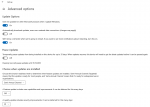isladogs
Access MVP / VIP
- Local time
- Today, 13:34
- Joined
- Jan 14, 2017
- Messages
- 19,341
Microsoft's current upgrade model is in my opinion badly flawed.
Even their support staff are advising people not to upgrade and to block such upgrades as long as possible
The last two Windows 10 updates have both caused me significant problems.
The 1803 update caused issues with the geolocation service in IE.
I reported this as a bug with v1803 in May. MS released a fix in June but it didn't work. Reported it again that month. Still not fixed
So I uninstalled v1803 reverting to v1709 & blocked further updates for the maximum time available - approx 3 months I believe.
Unfortunately I was away when that period ended & returned to find it had reinstalled itself ... hello I'm back (with the same issues). Grrr!
So it seemed worth the risk to allow the 1809 update when it was offered almost immediately afterwards hoping it would fix various issues
Sadly not as version 1809 immediately caused the following issues for me
1. Virtual Box had to be removed to install the update. Afterwards I reinstalled it but it no longer works
2. My Comodo code signing certificate cannot be used so I can't code sign my software
3. Geolocation data service still fails in IE.
All of these seriously affect my ability to test and distribute Access applications.
I've just removed v1809 after only 2 days and will again be informing MS of the latest issues.
Have reverted to 1803. The code signing certificate works perfectly again but the other 2 issues remain.
I'm likely to do a fresh install and stop at v1709 if I can still do so.
Although I have Office 365 and test my apps in that, I still develop using Access 2010 by choice as it is stable and the interface is in my view much more user friendly
Having said that, Office updates have only rarely caused me grief (though I still remember the debacle of Access 2003 SP3 & its subsequent hotfix)
I use Office 365 purely for testing so I know whether my clients who use it will have issues with any application updates I release
Even so, updated features like the new charts have sadly been utterly useless to me.
The interface looks better but the chart types are more limited.
The deal breaker is that, if new charts are used, clients with earlier versions of Access will see nothing other than an empty space where the chart should be. The documentation makes no mention of that!
Even their support staff are advising people not to upgrade and to block such upgrades as long as possible
The last two Windows 10 updates have both caused me significant problems.
The 1803 update caused issues with the geolocation service in IE.
I reported this as a bug with v1803 in May. MS released a fix in June but it didn't work. Reported it again that month. Still not fixed
So I uninstalled v1803 reverting to v1709 & blocked further updates for the maximum time available - approx 3 months I believe.
Unfortunately I was away when that period ended & returned to find it had reinstalled itself ... hello I'm back (with the same issues). Grrr!
So it seemed worth the risk to allow the 1809 update when it was offered almost immediately afterwards hoping it would fix various issues
Sadly not as version 1809 immediately caused the following issues for me
1. Virtual Box had to be removed to install the update. Afterwards I reinstalled it but it no longer works
2. My Comodo code signing certificate cannot be used so I can't code sign my software
3. Geolocation data service still fails in IE.
All of these seriously affect my ability to test and distribute Access applications.
I've just removed v1809 after only 2 days and will again be informing MS of the latest issues.
Have reverted to 1803. The code signing certificate works perfectly again but the other 2 issues remain.
I'm likely to do a fresh install and stop at v1709 if I can still do so.
Although I have Office 365 and test my apps in that, I still develop using Access 2010 by choice as it is stable and the interface is in my view much more user friendly
Having said that, Office updates have only rarely caused me grief (though I still remember the debacle of Access 2003 SP3 & its subsequent hotfix)
I use Office 365 purely for testing so I know whether my clients who use it will have issues with any application updates I release
Even so, updated features like the new charts have sadly been utterly useless to me.
The interface looks better but the chart types are more limited.
The deal breaker is that, if new charts are used, clients with earlier versions of Access will see nothing other than an empty space where the chart should be. The documentation makes no mention of that!



